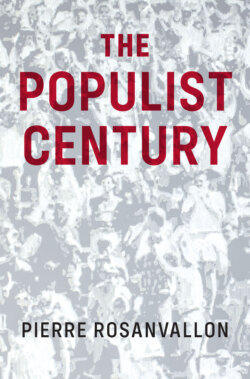Читать книгу The Populist Century - Pierre Rosanvallon - Страница 29
A conception of justice and equality
ОглавлениеThere are two ways to comprehend justice and equality. One is to conceive of them in terms of an understanding of relative positions between individuals, that is, to start from the different categories of inequalities that characterize individuals, whether in terms of income, patrimony, or opportunities. In this case, the goal is to distinguish potentially justifiable differences from those that it would be appropriate to reduce by means of policies governing taxation, redistribution, or enrichment of the human capital of individuals. This is the most common way of grasping the democratic imperative of equality. Another way, just as important but perhaps less often taken into account, is to consider equality as a quality of the relation between individuals (equality between a man and a woman is thus defined by the fact of living as equals, and not only in terms of distribution), and as a quality of a human community (the fact that everyone is recognized in it, that there exists a form of harmony among its members, that these members form an active polity).8 These two dimensions of equality are inseparable: no community of citizens is possible if the conditions of life are such that citizens evolve in totally separate worlds. But they are linked at the same time to specific types of institutions and politics that give them consistency.
The populist approach to this imperative of equality is characterized by two major features. First, it is polarized around the gap between the 1 percent and the 99 percent in terms of distributive equality, and by the same token it tends to relegate to second place all other manifestations of inequality within the world of the 99 percent (even though that world is far from homogeneous), and it simultaneously presupposes the unity of the universe of the 1 percent. Next, this approach strongly emphasizes the properly civic or societal dimension of equality, a dimension often neglected in the dominant approaches to the question. But the populist perspective does this in a quite particular way: it advances the notions of identity and homogeneity as components of a “good society” forming a democratic nation. And this is how the populist vision of equality relates to the national protectionist conception of the economy. The protectionist idea in fact presupposes that there is a well-constituted entity to be defended, an entity clearly distinguished from what is external to it. The notion of equality is thus conflated in this case with that of inclusion in a homogeneous whole. Understood in this sense, the fact of belonging to the nation institutes a form of negative equality, the form that establishes a group defined as a community distanced from other communities. This applies to foreigners in a legally self-evident way, but also, by extension, to all categories of undesirables or enemies, who end up being assimilated to foreigners. The feeling of equality is nourished in this case by a constant need to reinvigorate that distance. This contributes to relativizing the “internal” inequalities and considering them essentially as derivatives of globalism, including the expanded domain of the market, the increased mobility of individuals, the exacerbation of competition, and the liberal espousal of the differences that stem from these phenomena.
We must also recall that the development of many populist movements – and this is particularly apparent in Europe – has often been linked to the assertion of regional separatisms: regions refusing to be part of a fiscal and redistributive community that would include populations deemed no longer to be part of a common world, owing to their behavior as entities that “profit” from the welfare state. The Lega (League) in Italy9 and the Vlaams Belang (Flemish Interest) in Belgium10 are exemplary archetypes.11 One of the strengths of a movement like Matteo Salvini’s League lies in its ability to transcend the regionalist sentiment by “nationalizing” it, transferring the rejection of the South in Italy onto a critique of European institutions. The adversary is no longer “Roma Ladrona” (Rome the Thief), but the Brussels bureaucracy, drunk on regulations, an insidious machine for dispossessing peoples of their sovereignty. This is why the anti-European dimension is now one of the essential markers of populism on the continent. It gives a more modern and more readily acceptable tonality to a nationalism that is in fact highly traditional.
